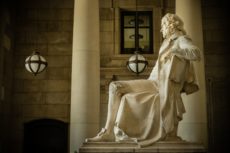Happy Birthday, Mr. Jefferson!
 April 13, 2017, marks the 274th anniversary of Thomas Jefferson’s birth. Most Americans know him as the drafter of the Declaration of Independence, third president of the United States, and founder of the University of Virginia. While these are great accomplishments, what we should remember him for most of all in this age of centralization are The Summary View of the Rights of British America (1774), Opinion on the Constitutionality of a National Bank (1791), and the draft of the Kentucky Resolution of 1798.
April 13, 2017, marks the 274th anniversary of Thomas Jefferson’s birth. Most Americans know him as the drafter of the Declaration of Independence, third president of the United States, and founder of the University of Virginia. While these are great accomplishments, what we should remember him for most of all in this age of centralization are The Summary View of the Rights of British America (1774), Opinion on the Constitutionality of a National Bank (1791), and the draft of the Kentucky Resolution of 1798.
The Summary View was a critical document that called into question the power of the British Parliament to legislate for America. Jefferson argued that Parliament had no power over the colonies and instead the sovereign legislative power rested with each colonial assembly. These mini-parliaments were closer to the people and better situated to legislate than such a distant body in which the people had no representation. Jefferson wrote in the Summary View “that experience confirms the propriety of those political principles which exempt us from the jurisdiction of the British parliament. The true ground on which we declare these acts [various statutes and commercial regulations] void is, that the British parliament has no right to exercise authority over us.” Parliament’s acts were “exercises of usurped power” and “intermeddle[ing]with the regulation of the internal affairs of the colonies.” The Summary View could be said to be Jefferson’s first statement of nullification.
In fighting against Hamilton’s national bank in the early 1790s, Jefferson sought to keep the new federal government within the confines of the enumerated powers. There was no power to charter corporations and the Philadelphia Convention had specifically declined to give the government such authority. Jefferson feared the doctrine of implied powers and understood how easy it was for the genie of loose construction to escape the constitutional bottle. Jefferson presciently warned Washington:
I consider the foundation of the Constitution as laid on this ground: That ” all powers not delegated to the United States, by the Constitution, nor prohibited by it to the States, are reserved to the States or to the people.” [The 10th amendment.] To take a single step beyond the boundaries thus specially drawn around the powers of Congress, is to take possession of a boundless field of power, no longer susceptible of any definition.
In 1798, Jefferson battled against the Alien and Sedition Acts. The Sedition Act made it a crime to criticize the national government. Under this statute, many newspaper editors were prosecuted and thrown into prison. In his draft of the Kentucky Resolution, Jefferson tackled such weighty matters as the nature of the union, the power of the Supreme Court, and doctrine of nullification.
Resolved that the several states composing the US. of America are not united on the principle of unlimited submission to their general government; but that, by a compact under the style & title of a Constitution for the US. and of Amendments thereto, they constituted a general government for special purposes, delegated to that government certain definite powers, reserving, each state to itself, the residuary mass of right to their own self-government; and that whensoever the General government assumes undelegated powers, it’s acts are unauthoritative, void, & of no force.
that to this compact each state acceded as a state, and is an integral party, it’s co-states forming, as to itself, the other party.
that the government created by this compact was not made the exclusive or final judge of the extent of the powers delegated to itself; since that would have made it’s discretion, & not the constitution the measure of it’s powers: but that, as in all other cases of compact among powers having no common judge, each party has an equal right to judge for itself, as well of infractions, as of the mode & measure of redress. . . .
where powers are assumed which have not been delegated a nullification of the act is the rightful remedy: that every state has a natural right, in cases not within the compact [casus non foederis] to nullify of their own authority all assumptions of power by others within their limits: that without this right, they would be under the dominion, absolute and unlimited, of whosoever might exercise this right of judgment for them.
Today, we live in Hamilton’s America with an omnipotent national government that is no longer bound by the chains of the Constitution. Let us use April 13th to reflect on the constitutional thought of Thomas Jefferson and the principles that can guide us back to a limited government.
***
William J. Watkins, Jr. is a Research Fellow at the Independent Institute and author of the book Crossroads for Liberty: Recovering the Anti-Federalist Values of America’s First Constitution.





